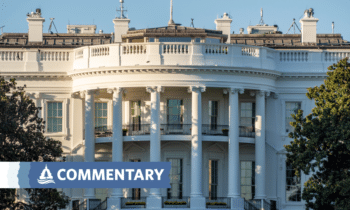 It is often said that everyone is entitled to their own opinion but not to their own set of facts. That cannot be said of Donald Trump, who has demonstrated a mastery of marshaling self-serving “facts,” no matter how improbable, as his own personal mythology.
It is often said that everyone is entitled to their own opinion but not to their own set of facts. That cannot be said of Donald Trump, who has demonstrated a mastery of marshaling self-serving “facts,” no matter how improbable, as his own personal mythology.
During his first term, President Trump was troubled by investigations and even impeachments. This time around, he is obviously determined not to be similarly encumbered. To that end, he is systemically eliminating any potentially independent source of contradiction by sidelining the federal “referees” who enforce the rules safeguarding whistleblowers and other truth-tellers.
For example, this past week, President Trump illegally fired the U.S. Special Counsel after removing the head of the Office of Government Ethics, both officials serving five-year terms following Senate confirmation.
On the evening of Friday, February 7th, the Trump White House sent U.S. Special Counsel Hampton Dellinger a two-sentence email informing him that his position was “terminated, effective immediately.” Dellinger, a Biden appointee, leads the office charged with enforcing protection of whistleblowers and the Hatch Act, the law outlawing political activity in office, among other duties. He was less than one year into a five-year term subject to removal by the President “only for inefficiency, neglect of duty, or malfeasance in office.”
No such misconduct has been cited by Trump. Dellinger is in federal district court this week to obtain a restraining order against Trump’s action.
Trump also removed one member of the three-member Merit Systems Protection Board (MSPB), the civil service court, which hears appeals of illegal terminations and other personnel actions. This move threatens the ability of MSPB to hear cases and threatens a repeat of Trump’s first-term refusal to appoint any members to serve on the MSPB, causing a huge backlog in civil service appeals once the MSPB lost its quorum and ability to decide cases – a backlog from which it is now only just recovering.
The upshot of these moves makes it more difficult for federal whistleblowers to have their allegations validated as well as to survive professional retaliation stemming from their speaking up. In other words, whistleblowers now stand a greater chance of being improperly silenced and then marginalized and/or removed from public service altogether than ever before.
For good measure, Trump has also removed David Huitema, a career government ethics official who served both Republican and Democratic administrations, from the office securing compliance with financial disclosures and ethics agreements. He had just begun a five-year term in December. With the high number of corporate appointees Trump is placing into key enforcement and regulatory roles, Huitema’s position would be pivotal in ensuring that illegal self-dealing does not occur.
All this comes on top of Trump’s firing 18 Inspectors General, including some of his own prior appointees from several major federal agencies such as the Departments of Energy, Agriculture, Labor, and Interior, as well as the Environmental Protection Agency. The “IGs” audit agency funds and investigates allegations of misconduct. This sweeping purge compromises the integrity of both current and future investigations because probes deemed inconvenient to White House interests are unlikely to occur regardless of their merit.
All this signals Trump’s unwillingness to tolerate the continued functioning of any quasi-independent federal office which could contradict or expose administration misstatements. In essence, Trump is fighting to secure his own set of facts free from the prospect of any official contradiction.
The fact that he is doing this with little resistance points to the very weakness of the safeguards establishing these authorities. Trump has clearly shown that reliance upon accepted norms and respect for ground rules are no longer operative.
Once he is gone, Congress must act to “Trump-proof” these institutions, so they are not vulnerable to summary removal. This means that laws protecting government whistleblowers, scientific integrity, and transparency all need to be significantly strengthened. Thus, government whistleblowers deserve a chance to have their cases heard by a jury of their peers, not just an MSPB. Similarly, the ability of government scientists to have their research published must be independently (i.e., judicially) enforced, making presidential suppression infeasible. Further, the Freedom of Information Act must be rewritten to serve as the basis for routine openness rather than pervasive secrecy.
The indelible lesson of these past few weeks is that we can no longer afford to allow control of the flow of information from public servants to the public to rest solely in the hands of a single individual, especially the president and especially this President. Instead, the avenues of official data, research, and analyses must ultimately have legal status that puts them beyond the reach of yet another felt-tipped Executive Order.
 Jeff Ruch is the former Executive Director and Pacific Director of PEER. He now serves as Of Counsel.
Jeff Ruch is the former Executive Director and Pacific Director of PEER. He now serves as Of Counsel.